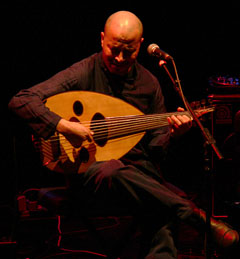
Dhafer Youssef
18 November 2004, Queen Elizabeth Hall, London Jazz Festival
Dhafer
Youssef’s music trains one eye on tradition and the other on how that
tradition can live, even thrive, in the present. Along with fellow oudists
Anouar Brahem and Rabih Abou-Khalil, he explores the interface between his
native Tunisian music and that of Western improvised musics. He has increasingly
woven contemporary elements including electronica, breakbeats and ambience
around his distinctive vocals and oud playing on albums such as Electric Sufi
and Digital Prophecy. This, together with a characteristic outspokenness,
help to define tonight’s performance. Youssef sits at the centre of
his group, the ancient, graceful shape of the oud seeming to glow against
his black clothes as he tweaks the miniature mixing desk at his side. From
time to time he directs a frank look at one of his colleagues, frequently
accompanied by a great, big smile that betrays the genuine pleasure he takes
in their performance. His voice ranges between a velvety, beseeching whisper
and an impassioned, extended yell. In full flight Youssef’s singing
achieves a fervent glossolalia, it’s candour perhaps even provoking
some discomfort for a small minority of the audience.
As with last year’s Digital Prophecy, Youssef is accompanied by some of the cream of Norway’s recent generation of musicians. On one side sits Arve Henriksen who, apart from some lovely trumpet solos, intermittently sings angel-like throughout the evening. On Youssef’s other side sits the more retiring Eivind Aarset, his face mostly hidden behind a curtain of shoulder-length, blond hair as he bends over his guitar. Aarset plays a generally supporting role, sketching ambiences behind his colleagues’ playing, only occasionally delivering a trademark solo in either monsoon wind or abstract noise mode: when these coalesce out of the background, they’re a joy to experience. Rune Arnesen, illuminated in the semi-darkness by a laptop screen, flutters stealthy, percussive streams from brushed cymbals while Audun Erlien provides solid support on electric bass. The emotional outspokenness mentioned earlier is typified partway through the evening when Youssef dedicates Norwegian Girl, an Aarset composition, to the latter’s recently deceased mother. What follows is an affecting lament whose distinctive melody is delineated vocally by both Henriksen and Youssef. The group’s music ebbs, swells, flows and floods, but there’s a loping, forward motion in Youssef’s music when nothing particular happens, which achieves a feeling of luminous movement that’s sufficient in itself and more subtly eloquent even than his vocals.
As with last year’s Digital Prophecy, Youssef is accompanied by some of the cream of Norway’s recent generation of musicians. On one side sits Arve Henriksen who, apart from some lovely trumpet solos, intermittently sings angel-like throughout the evening. On Youssef’s other side sits the more retiring Eivind Aarset, his face mostly hidden behind a curtain of shoulder-length, blond hair as he bends over his guitar. Aarset plays a generally supporting role, sketching ambiences behind his colleagues’ playing, only occasionally delivering a trademark solo in either monsoon wind or abstract noise mode: when these coalesce out of the background, they’re a joy to experience. Rune Arnesen, illuminated in the semi-darkness by a laptop screen, flutters stealthy, percussive streams from brushed cymbals while Audun Erlien provides solid support on electric bass. The emotional outspokenness mentioned earlier is typified partway through the evening when Youssef dedicates Norwegian Girl, an Aarset composition, to the latter’s recently deceased mother. What follows is an affecting lament whose distinctive melody is delineated vocally by both Henriksen and Youssef. The group’s music ebbs, swells, flows and floods, but there’s a loping, forward motion in Youssef’s music when nothing particular happens, which achieves a feeling of luminous movement that’s sufficient in itself and more subtly eloquent even than his vocals.
Colin Buttimer
Published by Me
